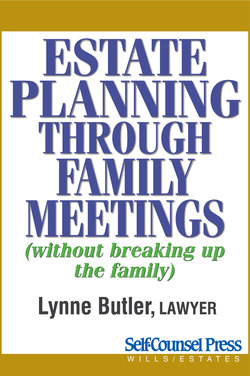Читать книгу Estate Planning Through Family Meetings - Lynne Butler - Страница 13
На сайте Литреса книга снята с продажи.
3. Believing That Estate Planning Is Only for Rich People
ОглавлениеThe word “estate” tends to make people think of enormous homes with fenced acreages and overseas bank accounts belonging to multi-millionaires. The phrase “estate planning” can conjure up visions of corporate empires. In other words, a lot of people think that estate planning is only for the very wealthy. This is not the case. Everyone has an estate, however modest it might be. Legally, the word “estate” simply refers to what you own and what you owe, even if your net worth is in the red. Estate planning refers to deciding what you want to do with your legal and financial affairs while you are alive and after your death. It is simply not true that estate planning is only for rich people.
Estate planning is for everyone. It is important for you to deal with whatever you have accumulated during your lifetime, regardless of whether it has a higher or lower dollar value than someone else’s estate. The fact that you are not rich does not mean that your spouse or children should be stuck with legal and financial problems after you have passed away.
Money is not always at the root of estate lawsuits. Although it may seem strange, estate legal battles are not always fought over large sums of money. That does happen too, of course, but estate battles are often about personal belongings or household items which have great sentimental, as opposed to monetary, value to the deceased person’s family. You do not have to be wealthy to own family photo albums, mementos, heirlooms, souvenirs, or other important sentimental items.
People will fight to keep family items that have sentimental value, as evidenced by hundreds of disputes every year. The idea that estate fights only happen to wealthy people is completely wrong. We hear more about fights of wealthy families simply because the dollar amounts are so large or the families are famous. Unfortunately, the fights happen in every economic bracket.
If a dispute of an estate cannot be resolved among the people involved, it will likely end up being decided by a judge. This means court fees; lawyer’s fees; accountant’s fees; and miscellaneous costs such as process servers, witnesses, and time off work. If a legal battle does erupt over a personal item, it is possible that a modest estate might be completely bankrupted by fees. A lawyer is probably going to charge the same hourly rate to wage a court battle whether the fight is over a multimillion-dollar property or a family wedding ring that is only worth a couple of thousand dollars.
Looked at in the light of possible bankruptcy of the estate, it becomes even more important for a modest estate to be protected by proper planning.
When thinking about estate planning, people also forget that legal documents reveal much more than simply who gets what from the assets. For example, your will and incapacity documents tell you who your parents have chosen to put in charge of their affairs in the roles of executor, attorney (under enduring power of attorney), and health-care representative. If you do not have that information, the end result will likely be delays and confusion. The information about who is to be given legal authority over someone else’s affairs is extremely important regardless of the dollar value.
